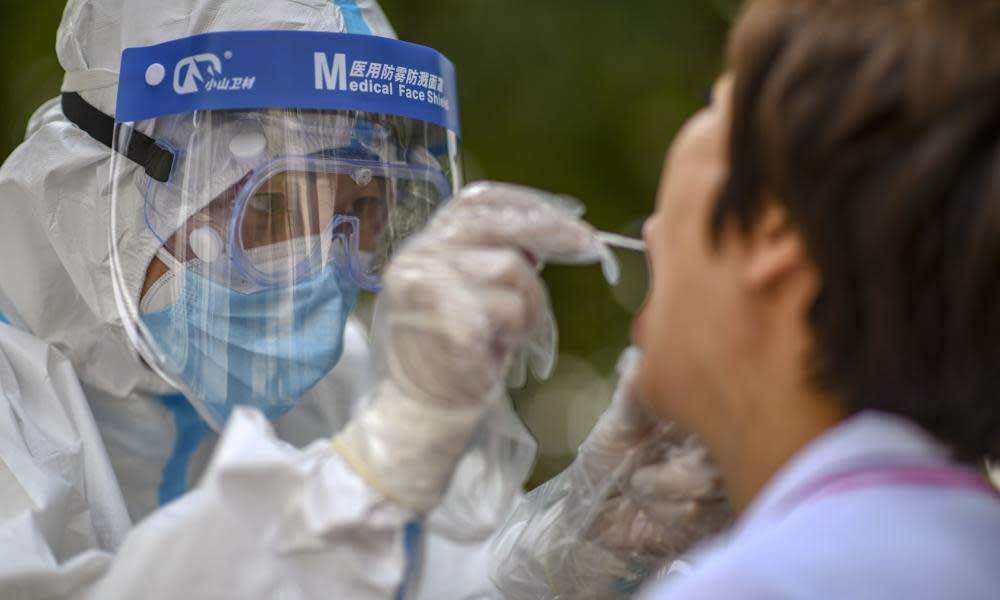Global report: China records most daily cases since March; poverty fears in south-east Asia

China has recorded its highest daily total of new Covid-19 cases since early March, as the United Nations warned the pandemic could force tens of millions of people in south-east Asia into extreme poverty.
Chinese health authorities confirmed 127 new cases, including four imported and 123 local transmissions. Of the local transmissions, 112 were in Xinjiang and 11 in the province of Liaoning. Separately, authorities also reported 11 new asymptomatic cases.
This week has seen China’s largest daily rises in cases since the peak, with 105 reported on Wednesday, 101 on Tuesday, and 68 on Monday.
Global coronavirus cases stand at 17,219,767, according to the Johns Hopkins university tracker, with nearly 672,00 deaths.
In Xinjiang, strict anti-virus measures have been in place in the capital Urumqi for over a week, including the suspension of most public transport and flights, and controls on the entry and exit of people at housing compounds in some districts.
However, experts have sounded the alarm over the risk to people detained in China’s secretive internment camps. Clusters of infections have been recorded in Urumqi, and the city of Kashgar about 300km away, suggesting infections could be widespread in between. There are fears the virus could be brought into the camps by employees, or brought into the homes of Uighur and other Turkic minority families by Han Chinese who move into their house under a compulsory homestay program.
The Liaoning outbreak in the country’s east, is centred on the capital city, Dalian, but has spread to other cities and provinces in recent days. State media reported more than 17,500 medics had been mobilised to run almost 2,700 testing sites across the city. By midnight on Tuesday about 3.53m samples had been collected, CCTV reported.
Since bringing the virus largely under control after the outbreak began in Wuhan more than seven months ago, China continues to see frequent outbreaks in large cities, including in Beijing, and a second spike in Wuhan. Authorities have responded quickly with varying degrees of lockdown measures, and large-scale testing, which the state mouthpiece China Daily described as now being a “default response to new clusters of Covid-19”.
It said more than 2.3m tests were conducted in Urumqi in the first 10 days of the outbreak, and more than 1.2m on the first day of Dalian’s outbreak. In Urumqi 13 to 38 asymptomatic carriers a day were identified, China Daily said. A National Health Commission spokesman claimed China had the capability to test 3.78 million people a day, and had doubled the number of testing facilities between early March and late June.
In south-east Asia, the UN has said decades of progress in tackling poverty could be undone by the economic impact of coronavirus.
While many countries in the region have managed to control the pandemic, it has disrupted trade, and brought travel to a standstill in tourism-dependent countries such as Thailand. Migrant workers who send remittances back home to their families, a major source of income in countries such as the Philippines, have been left stranded and without employment.
The UN warned of rising unemployment in countries such as Malaysia, the Philippines and Indonesia, adding that: “[A] lack of secured income and sufficient social protection could force tens of millions of people into extreme poverty in this region,” it said.
It also raised alarm over the situation facing the region’s 218 million informal workers, who have not only lost their livelihoods but also face rising xenophobia in some countries.
The policy brief, released on Thursday, urged governments to fix long-standing problems such tax evasion, transfer pricing, and subsidies supporting fossil fuels, and called for higher health spending.
Across the region, it is estimated that GDP will contract on average by 0.1% in 2020, compared with a pre-Covid-19 forecast of 4.5% growth. Remittances from workers across east Asia and the Pacific are expected to fall by 13% or $10bn.
Vietnam has reported 45 new coronavirus infections in the city of Danang, marking the country’s biggest single-day jump in cases, as the health ministry sent more health experts to the central city in a bid to combat the outbreak.
In Indonesia, the governor of the capital, Jakarta, Anies Baswedan, extended social restrictions on Thursday to curb coronavirus transmission, warning of “a hike in cases”. Schools will remain closed and restaurants and public transportation will continue to operate at limited capacity until 13 August.
“There has not been any improvement from two weeks ago to right now,” he said, adding that there had been clusters found in offices in the capital.
Indonesia has reported a total of 106,336 coronavirus cases, the biggest in east Asia, though it is feared by some health experts that this is an underestimate.
The Philippines, which is also among the hardest hit in the region, announced on Friday that it would maintain coronavirus restrictions in the capital Manila until mid-August, following a rise in cases. This includes restrictions on movement for elderly and children, and limits on the capacity of businesses.
Presidential spokesperson Harry Roque this week promised “major changes” in the government’s response, but did not confirm if a stricter quarantine will be imposed. Roque said testing will be expanded and that the country will make greater use of PCR (polymerase chain reaction) tests. These tests, however, only detect antibodies and so have been criticised by some health experts, who say they are less accurate.
In other global developments:
The US economy shrank by an annual rate of 32.9% between April and June, its sharpest contraction since the second world war, government figures revealed on Thursday.
Tens of thousands of people in the north of England woke up to new lockdown restrictions that came into force at midnight on Thursday night. The new requirements will apply in Greater Manchester, West Yorkshire and East Lancashire after an increase in cases.

 Yahoo News
Yahoo News 
